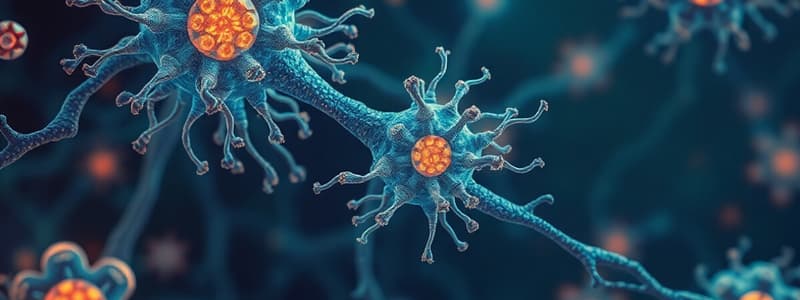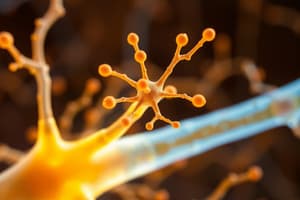Podcast
Questions and Answers
What is the primary function of sense organs in humans?
What is the primary function of sense organs in humans?
- To allow detection of various sensations. (correct)
- To regulate emotional responses.
- To improve physical strength.
- To enhance memory retention.
Which of the following is NOT considered one of the main senses?
Which of the following is NOT considered one of the main senses?
- Balance (correct)
- Hearing
- Smell
- Touch
What triggers a receptor to send an impulse to the brain?
What triggers a receptor to send an impulse to the brain?
- A strong stimulus. (correct)
- Muscle contraction.
- Chemical secretion.
- A random thought.
What role does the brain play in processing stimuli detected by receptors?
What role does the brain play in processing stimuli detected by receptors?
Which type of animals have electrosensitive organs to detect electrical impulses?
Which type of animals have electrosensitive organs to detect electrical impulses?
What are nociceptors primarily responsible for detecting?
What are nociceptors primarily responsible for detecting?
Which type of pain fibers are responsible for sharp, localized pain?
Which type of pain fibers are responsible for sharp, localized pain?
Where are fast pain fibers primarily located?
Where are fast pain fibers primarily located?
What type of pain do slow pain fibers produce?
What type of pain do slow pain fibers produce?
Where are nociceptors NOT found?
Where are nociceptors NOT found?
What characteristic allows the brain to determine the location of a stimulus?
What characteristic allows the brain to determine the location of a stimulus?
Which type of receptor is specifically designed to respond to light?
Which type of receptor is specifically designed to respond to light?
Which of the following describes the phenomenon of adaptation?
Which of the following describes the phenomenon of adaptation?
What type of receptor responds to physical changes such as pressure or vibration?
What type of receptor responds to physical changes such as pressure or vibration?
What is the role of proprioceptors in the body?
What is the role of proprioceptors in the body?
Which type of receptor is responsible for detecting pain from tissue damage?
Which type of receptor is responsible for detecting pain from tissue damage?
What aspect of a stimulus indicates its intensity?
What aspect of a stimulus indicates its intensity?
What do thermoreceptors specifically respond to?
What do thermoreceptors specifically respond to?
What forms cranial nerve I?
What forms cranial nerve I?
What is the primary function of the auricle (pinna)?
What is the primary function of the auricle (pinna)?
Which part of the ear is responsible for producing cerumen?
Which part of the ear is responsible for producing cerumen?
What is closely related to the sense of smell?
What is closely related to the sense of smell?
What credential is associated with the receptor cells responsible for olfaction?
What credential is associated with the receptor cells responsible for olfaction?
What term describes pain that is sensed in a different area from where it originates?
What term describes pain that is sensed in a different area from where it originates?
Which part of the body is commonly associated with referred pain from the heart?
Which part of the body is commonly associated with referred pain from the heart?
Which type of papillae contain the majority of taste buds on the tongue?
Which type of papillae contain the majority of taste buds on the tongue?
What is the role of filiform papillae on the tongue?
What is the role of filiform papillae on the tongue?
What type of pain relief medication is referred to as analgesics?
What type of pain relief medication is referred to as analgesics?
What is the primary function of the auricle (pinna) in the outer ear?
What is the primary function of the auricle (pinna) in the outer ear?
Which of the following structures separates the outer ear from the middle ear?
Which of the following structures separates the outer ear from the middle ear?
What is the role of the auditory ossicles in the middle ear?
What is the role of the auditory ossicles in the middle ear?
Why are middle ear infections more common in children?
Why are middle ear infections more common in children?
What structure leads from the middle ear to the nasopharynx and helps equalize pressure?
What structure leads from the middle ear to the nasopharynx and helps equalize pressure?
What is the primary function of taste buds?
What is the primary function of taste buds?
Which type of papillae are concentrated at the tip and sides of the tongue?
Which type of papillae are concentrated at the tip and sides of the tongue?
How often do taste bud cells replace themselves?
How often do taste bud cells replace themselves?
Which taste is the most sensitive at the tip of the tongue?
Which taste is the most sensitive at the tip of the tongue?
What does umami refer to?
What does umami refer to?
What is the main purpose of the foliate papillae?
What is the main purpose of the foliate papillae?
Which cranial nerve is responsible for taste at the rear of the tongue?
Which cranial nerve is responsible for taste at the rear of the tongue?
What are chemoreceptors within taste buds called?
What are chemoreceptors within taste buds called?
What is the primary function of the vestibule and semicircular canals?
What is the primary function of the vestibule and semicircular canals?
How are the semicircular canals arranged?
How are the semicircular canals arranged?
Which structures are located inside the vestibule?
Which structures are located inside the vestibule?
What is the role of the semicircular canals when the head is moved?
What is the role of the semicircular canals when the head is moved?
What is the process called that relates to balance in the inner ear?
What is the process called that relates to balance in the inner ear?
What is the primary role of the semicircular canals in the inner ear?
What is the primary role of the semicircular canals in the inner ear?
Which fluid is found within the membranous labyrinth of the inner ear?
Which fluid is found within the membranous labyrinth of the inner ear?
What determines the pitch of a sound?
What determines the pitch of a sound?
Which structure in the cochlea is responsible for the sense of hearing?
Which structure in the cochlea is responsible for the sense of hearing?
What is the frequency range that the human ear can typically respond to?
What is the frequency range that the human ear can typically respond to?
What initiates the process of hearing?
What initiates the process of hearing?
Which structure vibrates first when sound waves are received?
Which structure vibrates first when sound waves are received?
Which of the following statements about conductive hearing loss is true?
Which of the following statements about conductive hearing loss is true?
What happens to the ripples in the perilymph after reaching the organ of Corti?
What happens to the ripples in the perilymph after reaching the organ of Corti?
Which type of hearing loss is primarily caused by damage to hair cells?
Which type of hearing loss is primarily caused by damage to hair cells?
What role does the stapes play in the hearing process?
What role does the stapes play in the hearing process?
What is the consequence of damaged hair cells in sensorineural hearing loss?
What is the consequence of damaged hair cells in sensorineural hearing loss?
What structure does the ripples in the perilymph affect after leaving the oval window?
What structure does the ripples in the perilymph affect after leaving the oval window?
Flashcards are hidden until you start studying
Study Notes
Sensory Receptors
- Sensory receptors are specialized cells that transmit information about the type, location, and intensity of a stimulus.
- Each sensory receptor responds to a specific type of stimulus.
- Each sensory neuron has a receptive field, an area where it responds to stimuli.
- The brain interprets the intensity of a sensation based on the number of nerve fibers firing.
Classification of Receptors
- Chemoreceptors: Respond to chemicals.
- Mechanoreceptors: Respond to changes in position, pressure, stretch, or vibration.
- Thermoreceptors: Respond to temperature changes.
- Nociceptors: Respond to tissue damage.
- Photoreceptors: Respond to light.
Adaptation
- The firing frequency of a nerve slows down when a stimulus is continuous, leading to a diminished sensation.
- This is known as adaptation.
Proprioceptors
- Proprioceptors are specialized receptors found in muscles, joints, and tendons.
- They provide information about body movement and orientation.
The General Senses
- The general senses include pain, pressure, touch, stretch, and temperature.
- Receptors are widely distributed in the skin, muscles, tendons, joints, and viscera.
Pain
- Nociceptors or pain receptors are free nerve endings that transmit pain impulses to the brain.
- They are found in the skin, mucous membranes, and most organs.
- Fast pain fibers produce a sharp, localized pain.
- Slow pain fibers produce a dull, aching pain.
- Referred pain occurs when pain originating in a deep organ is perceived as coming from the body's surface.
The Special Senses
- The special senses include taste, smell, hearing, equilibrium, and vision.
- Receptors are grouped together or clustered in specialized organs.
Taste (Gustation)
- Taste is caused by chemicals contacting taste buds.
- Taste buds are found on the tongue, in the lining of the mouth, and on the soft palate.
- The four primary tastes are salty, sweet, sour, and bitter.
- Umami, a "meaty" taste caused by amino acids, is a potential fifth category.
- All regions of the tongue can detect all tastes, but some areas are more sensitive to certain tastes.
Smell (Olfaction)
- The sense of smell is located within the nasal cavity.
- Receptor cells are neurons that gather to form the olfactory nerve (cranial nerve I).
Hearing
- Ears are responsible for hearing and balance.
- The ear comprises the outer, middle, and inner ear.
Outer Ear
- The auricle (pinna) funnels sound into the auditory canal.
- The auditory canal leads to the eardrum (tympanic membrane).
- The canal secretes earwax (cerumen).
Middle Ear
- Contains the three auditory ossicles: malleus, incus, and stapes.
- The ossicles transmit sound from the outer ear to the inner ear.
- The oval window connects the middle ear to the inner ear.
- The eustachian tube connects the middle ear to the nasopharynx, helping to equalize pressure.
Inner Ear
- Within the temporal bone, contains the bony labyrinth filled with perilymph and lined with the membranous labyrinth filled with endolymph.
- The bony labyrinth has three structures: semicircular canals, vestibule, and cochlea.
- The Organ of Corti, located within the cochlea, is the hearing sense organ.
- The cochlea contains hair cells and the tectorial membrane.
How Hearing Works
- Sound waves vibrate the eardrum.
- The ossicles transmit these vibrations to the oval window.
- Vibrations in the perilymph stimulate the hair cells in the Organ of Corti.
- Nerve impulses travel along the cochlear nerve to the auditory cortex in the temporal lobe.
Hearing Loss
- Conductive hearing loss is caused by interference with vibration transmission to the inner ear (e.g., fluid, earwax, ossicle fusion).
- Sensorineural hearing loss is caused by damage to the hair cells in the Organ of Corti, typically from exposure to loud noises.
Balance (Equilibrium)
- The vestibule and semicircular canals of the inner ear are responsible for balance.
- The semicircular canals lie at right angles to each other, allowing them to be stimulated by different movements.
- The utricle and saccule, located in the vestibule, also contribute to balance.
Studying That Suits You
Use AI to generate personalized quizzes and flashcards to suit your learning preferences.



